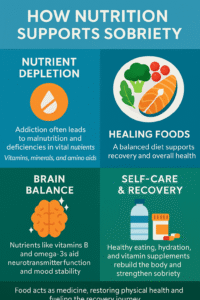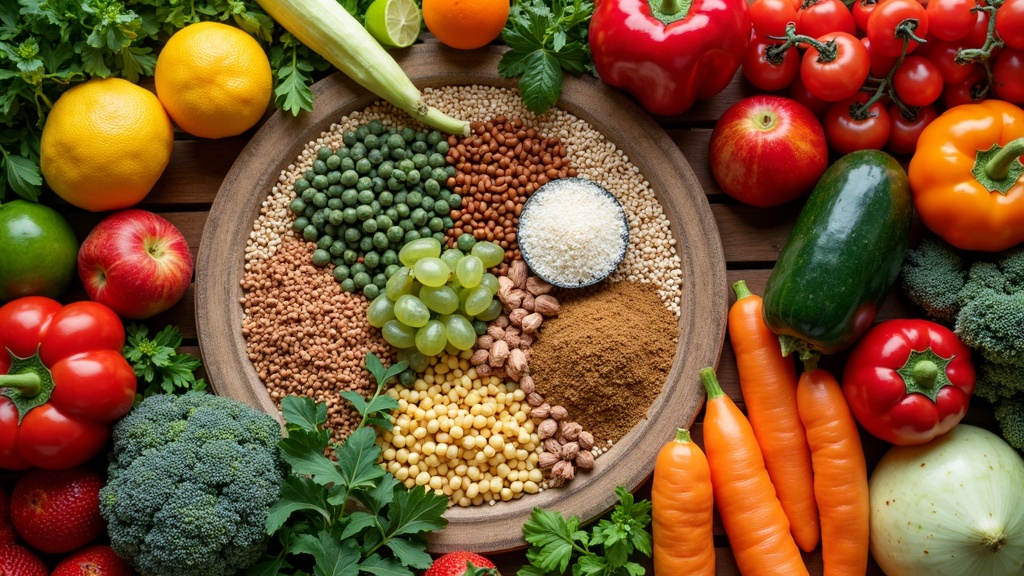Nutrition has a significant influence on recovery, especially for people working toward sobriety. After months or even years of substance use, the body often gets run down, leaving many feeling weak, foggy, or just not quite themselves. Good nutrition makes the difference. Eating well helps rebuild strength, sharpen your mind, and support ongoing wellness. I want to share what I’ve learned about how nutrition supports the recovery adventure and provide some practical tips anyone can use.
The Connection Between Nutrition and Recovery
A lot of people don’t realize how much substance use can throw off the body’s normal function. Alcohol, drugs, and even prescription meds can drain the body of key nutrients or make it tough for the body to use what you do eat. Missing out on vitamins, minerals, and the building blocks your organs need can leave you foggy, tired, and moody. As a result, the right nutrition plan helps regain your energy and helps your brain and body heal.
Research shows that nutrition plays a part in stabilizing mood, boosting energy, and reducing cravings. According to the National Institutes of Health, proper nourishment can help balance neurotransmitters in the brain that get disrupted by substance use. When I started paying attention to what I ate, my cravings changed, and my mood lifted. Eating wholesome foods actually helped me stay focused and grounded.
It’s also about confidence. Making meals, choosing foods, and eating regularly give you a sense of control—it’s a small but steady win that can add up in early recovery. Building routines, like meal prep or grocery planning, is also a way to replace time or behaviors that used to go to substance use. Over time, this new focus on your body and its needs starts paying off.
Common Nutritional Deficiencies in Recovery
The most common nutrient deficiencies in recovery usually result from long-term substance use and irregular eating habits. Alcohol depletes the body of B vitamins (like thiamine and folate), vitamin D, and key minerals like magnesium and zinc. Opiates and stimulants can also affect appetite and digestion, leading to missed meals or poor food choices.
Some signs of nutritional deficiencies include:
- Persistent fatigue or low energy
- Mood swings or trouble focusing
- Slow wound healing
- Weakened immune system and frequent illness
If any of this sounds familiar, you’re not alone. Anyone can improve their nutrition, and even small changes matter. Doctor and dietitian support can be helpful, but you can start with a few basics. If you ever have doubts, check in with a professional for guidance. Everyone’s needs differ, and checking up on your bloodwork can often spot specific deficiencies early.
Practical Tips for Eating Well in Early Recovery
Changing how you eat after a long stretch of substance use can seem overwhelming, especially if planning meals isn’t part of your routine yet. I found it helpful to keep things simple and build steadily from there.
- Focus on Regular Meals: Skipping meals can cause big spikes and crashes in blood sugar, often leaving you irritable or craving a quick fix. Aim to eat three balanced meals daily (plus snacks if needed) to keep your energy on track. Setting a loose meal schedule helps your body get in a rhythm again.
- Include Protein and Healthy Fats: Foods like eggs, chicken, beans, fish, tofu, nuts, and seeds help repair tissues and keep you full longer. Healthy fats from avocado, olive oil, and nuts also boost your brain while supporting smooth cell function.
- Add Colorful Fruits and Veggies: The brighter, the better! Fresh produce brings vitamins, fiber, and antioxidants that support healing and reduce inflammation. Aiming for a rainbow on your plate means getting a broader mix of nutrients daily.
- Stay Hydrated: Drinking water is sometimes forgotten, but your body needs it to flush toxins and support healing. Carry a refillable water bottle as a daily reminder. Herbal teas, sparkling water, and fruit-infused water help keep things interesting, too.
- Limit Sugar and Processed Food: Sugar cravings can be intense if you’re in early recovery. But processed snacks and sugary drinks cause your blood sugar to spike and crash, leaving you more tired and moody. Swap soda or candy with whole fruit or yogurt for a steadier energy lift.
I started with these basic steps and added more variety over time. Meal prepping on Sundays helped me avoid last-minute junk food choices during the week. Simple leftovers or batch-cooked grains and roasted vegetables can turn into easy meals, so you always have something nourishing ready to go. Adding a couple of go-to easy recipes to your rotation is also helpful.
Challenges and How to Work Through Them
Nutritional changes during recovery often hit a few bumps. Maybe there’s low appetite, digestion issues, or simple food boredom. I had days when nothing sounded appetizing, but over time, being gentle with myself and focusing on progress instead of perfection kept me on track.
- Low Appetite: Start with small, frequent meals. Broth-based soups, smoothies, and snacks like nuts or yogurt can be easier to manage until your appetite returns. Sometimes, adding a bit of lemon or spice to your food can also wake up your senses.
- Digestive Upset: Ginger tea, peppermint, and probiotic-rich foods like yogurt or kefir can help. If symptoms persist, check with a health professional. Occasionally, walking after meals or eating slowly can settle your digestion as your gut heals.
- Guilt or Shame About Eating Habits: Recovery is about healing, not perfection. If you “slip” and eat fast food or lots of sweets, let it go and move on. Every meal is a new chance to take care of yourself. Positive reinforcement works wonders; give yourself credit for any step forward.
I’ve noticed community meals, group cooking nights, and shared potlucks can turn eating into a meaningful, supportive activity—worth trying if you have recovery friends with similar goals. These events also add fun and connection to the eating experience. Sharing recipes or meal ideas is another way to bond and stay inspired to eat well.
Foods That Help Heal in Recovery
Some foods seem especially helpful for healing and recovery. Here’s a list I’ve found easy to work with:
- Leafy greens and cruciferous veggies: Spinach, kale, broccoli, and Brussels sprouts help restore vitamins and minerals and offer fiber to smooth digestion. These greens work well in salads, stir-fries, or even blended into smoothies.
- Whole grains: Oats, brown rice, barley, and quinoa supply steady energy, especially if your blood sugar fluctuates. Swapping out white bread or pasta for whole grains can also make meals more filling.
- Lean protein: Fish, poultry, beans, tofu, and eggs support tissue repair and keep you full. Mixing up your protein choices helps with taste and provides a good range of nutrients.
- Berries and citrus fruit: Loaded with antioxidants, these fight inflammation and help your immune system bounce back. Sprinkle berries over oatmeal, toss citrus into salads, or have fruit for dessert.
- Fermented foods: Yogurt, kefir, sauerkraut, and kimchi support gut health, which helps you absorb nutrients better and can even benefit your mood.
My favorites include overnight oats with berries for breakfast and grain bowls with leafy greens, beans, and a zesty dressing for lunch or dinner. These are simple but really filling and nourishing. Rotating a few easy, nutritious meals keeps things fresh and prevents burnout on your eating plan. Experimenting with new ingredients, like lentils or spices, can excite food.
Hydration in the Recovery Process
Staying hydrated might sound basic, but it makes a big difference. Water supports the body’s natural detox processes, helps prevent constipation, and is needed for every cell to function. I felt more alert and less achy when I increased my water intake. If plain water doesn’t appeal, herb teas or adding fruit slices can make it more interesting. Seltzer with a squeeze of orange or lemon is refreshing, too.
- Carry a Water Bottle: Having it within reach encourages sipping throughout the day. Put it somewhere visible so you remember to stay hydrated.
- Limit Caffeine: Coffee and energy drinks can pull water out of your system quickly, so it’s best to keep these in check and balance with extra water. Green tea or decaf options offer something warm without as much caffeine.
Is Supplementation Needed?
Supplements can be helpful, especially in early recovery, but they don’t replace a balanced diet. A standard multivitamin, Vitamin B Complex, or vitamin D supplement can help fill gaps if your appetite isn’t normal or you’re restricted in what you can eat. Always chat with your healthcare provider before adding new supplements, especially if you’re on medication, because there can be interactions. Bloodwork can spot what you need, so avoid self-prescribing unless you’re certain.
Frequently Asked Questions
Here are a few questions I often hear about nutrition in sobriety:
Question: Why do I crave sugar so much in early recovery?
Answer: When you stop using drugs or alcohol, the brain and body want fast sources of comfort, and sugar often steps in to fill that gap. Choosing fruits or whole grains over candy or soda can help manage cravings and give you more lasting energy. Over time, as your body stabilizes, the intensity of sugar cravings generally fades.
Question: Should I avoid caffeine?
Answer: Caffeine is approved for some people in moderation. Others may feel jittery, anxious, or have trouble sleeping with too much. Pay attention to how your body reacts and talk with your provider if unsure. Switching to decaf or herbal teas in the afternoon can also help with better sleep.
Question: Do I need a special “recovery diet”?
Answer: There’s no one way to eat in recovery. The best diet is balanced, regular, and enjoyable. Homemade meals with various colors and fresh ingredients work for most people. Eating with others can sometimes increase social support and motivation.
Real-World Examples of Nutrition in Action
I’ve seen the power of good nutrition firsthand in group recovery settings. Clients who started eating regular meals and focusing on whole foods noticed fewer cravings and better moods within a few weeks. A friend in recovery found that prepping healthy snacks ahead of time reduced his impulse to reach for junk food, and he felt more energetic by the end of the month. Others have told me that cooking for themselves became a point of pride and self-care, which helped anchor their sobriety in daily routines. These stories show that making intentional food choices, big or small, can impact the recovery experience.
Staying Consistent and Being Kind to Yourself
Eating your way to sobriety involves patience and plenty of self-kindness. Not every day will look perfect, and that’s okay. What matters most is focusing on progress (not perfection) and building habits that work for you. If you stumble, adjust and keep moving forward. Nutrition is a steady partner in your adventure to feel better, think clearly, and enjoy life beyond addiction. Remember, every small choice builds up—give yourself time, grace, and encouragement as you set your sights on lasting wellness.
Video: What Happens to Your Body When You Quit Addictions?

